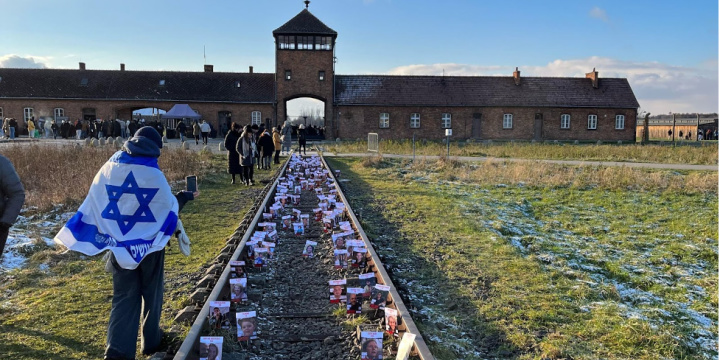‘The murder and kidnapping of Jews today is happening against the backdrop of what we describe when we tell the story of the 1.1 million Jews in Auschwitz.’
By Debbie Weiss, The Algemeiner
During a tour of Auschwitz-Birkenau this week, a group of Jewish school students from the UK placed photos of the nearly 200 remaining hostages held by the Hamas terror group in Gaza on the train tracks leading up to the gates of the Nazis’ largest death camp.
Zak Jeffay — director of Jewish education at JRoots, which organized the trip to Poland for students from London’s JFS — said Auschwitz was the “ultimate symbol” of Jew-hatred and as such it made sense to pay tribute to the Israeli hostages outside the death camp.
“One of the big topics students grapple with time and time again is understanding where the antisemitism of 80 years ago fits into what we’re experiencing and understanding today,” Jeffay told The Algemeiner.
“The murder and kidnapping of Jews today is happening against the backdrop of what we describe when we tell the story of the 1.1 million Jews in Auschwitz,” he added.
According to Talia Giffin, a teacher at the school, placing the images of the hostages served as a “strong reminder to students that unfortunately, we’re still living in times of people hating Jews for no reason.”
Being confronted with the faces of the hostages before entering the Nazi concentration camp was “a stark reminder that all of these things are still going on and that what happened on Oct. 7 was no different to the horrific things that occurred in World War II,” Giffin told The Algemeiner.
Giffin added that the move also symbolized the “inseparable” connection between Israel and Judaism.
“It negates any argument trying to separate anti-Zionism from antisemitism. It showed clear as day that hating Israel is hating Jews — they are one and the same. It’s really important to teach that to our students,” she said.

British teens placed pictures of Israeli hostages seized by Hamas on the train tracks leading to Auschwitz-Birkenau, the notorious Nazi death camp. (Facebook/Jroots)
There has been a global surge in antisemitism since Hamas’ massacre across southern Israel on Oct. 7, with the US and several European countries experiencing record numbers of antisemitic incidents.
Holocaust survivors from across the world have released powerful testimonies saying they feel unsafe for the second time in their lives since the Oct. 7 onslaught, in which Palestinian terrorists led by Hamas killed 1,200 people, mostly civilians, and kidnapped over 240 others as hostages.
There are currently just under 200 people remaining in captivity in Hamas-ruled Gaza following a ceasefire deal in which dozens of the hostages taken last month were released.
During the six-day trip to Auschwitz, the biggest death camp of the Holocaust, the students also visited Jewish sites in Warsaw, Lublin, and Krakow.
Menucha Sampson, a 17-year-old student at the school, said the decision to place the images of the hostages on the train tracks brought a “detached history back to the present day.”
Another student, Jake Kushner, 17, said: “The Holocaust ended but that hasn’t stopped antisemitism growing. People have no limits when it comes to attacking Jews.”
But despite the horrors of both the past and the present, the trip ended on a note of optimism, he said.
“By the end of it, we were walking out [of the camp] singing Am Yisrael Chai (“the nation of Israel lives”), and that showed they’ll never actually succeed,” Kushner said.
